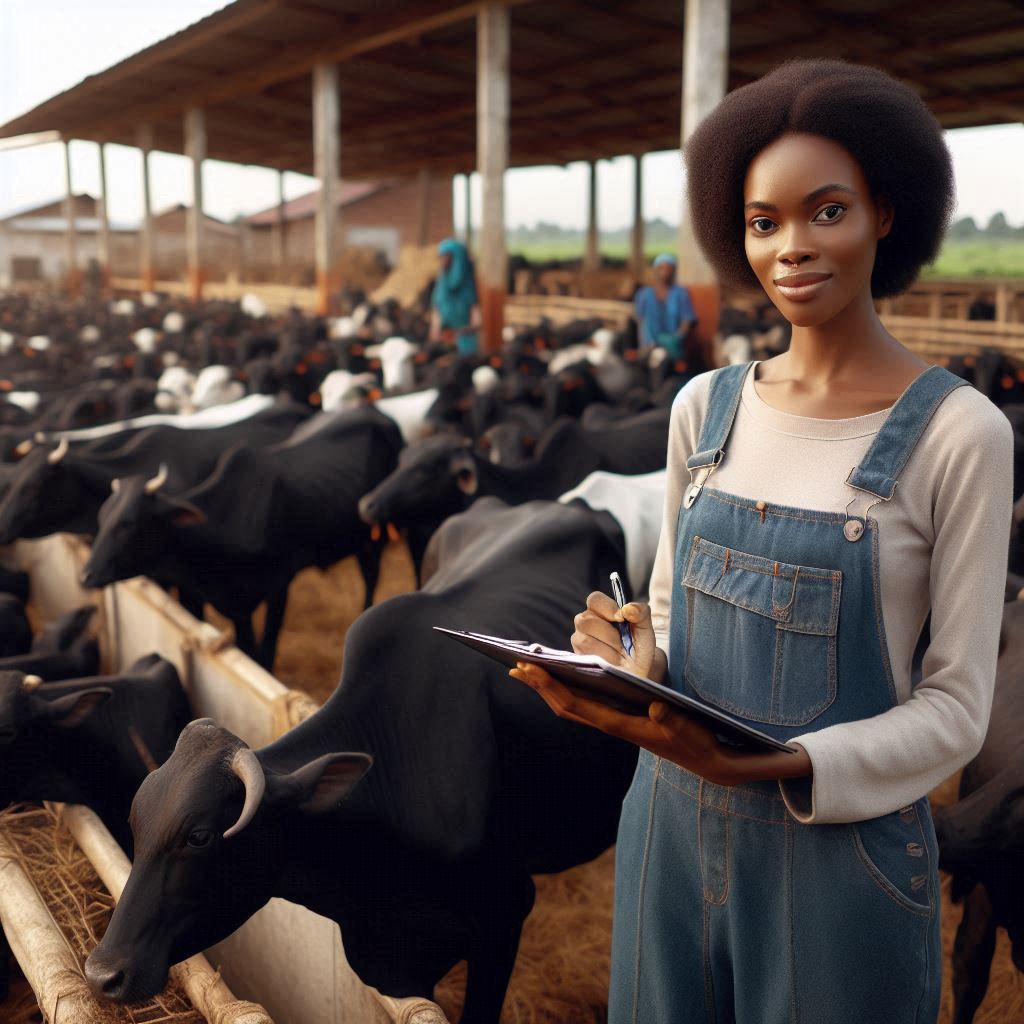Introduction
Current State of Livestock Production in Nigeria
Livestock production in Nigeria is diverse and growing. Farmers raise cattle, goats, sheep, and poultry across the country.
The sector faces challenges such as inadequate infrastructure and disease outbreaks. Despite these issues, livestock farming remains a crucial part of Nigeria’s agricultural landscape.
Importance of Livestock Production to the Nigerian Economy
Livestock production significantly contributes to Nigeria’s economy. It provides employment for millions of people. The sector also supplies essential proteins through meat, milk, and eggs.
Livestock farming supports rural livelihoods and helps reduce poverty. Additionally, it contributes to Nigeria’s GDP and food security.
In essence, Nigerian livestock production is vital for economic growth and sustainability. Addressing current challenges will enhance its future potential. Continued development in this sector promises further contributions to the Nigerian economy.
Technological advancements in livestock production
Use of artificial intelligence and data analytics in farming
In recent years, technological advancements have played a crucial role in transforming the landscape of livestock production in Nigeria.
The integration of cutting-edge technologies such as artificial intelligence and data analytics has revolutionized traditional farming practices, paving the way for more efficient and sustainable methods of raising livestock.
One of the key trends in Nigerian livestock production is the increasing use of artificial intelligence (AI) and data analytics to optimize farm operations.
By leveraging AI-powered tools, farmers can now analyze vast amounts of data related to animal health, nutrition, and environmental conditions to make informed decisions.
This data-driven approach enables farmers to enhance productivity, minimize risks, and ensure the well-being of their livestock.
Adoption of precision livestock farming techniques
Furthermore, the adoption of precision livestock farming techniques has gained traction in the Nigerian agriculture sector.
This approach involves the use of sensors, monitoring devices, and automated systems to track and manage individual animals’ health and behavior in real-time.
With precision farming techniques, farmers can monitor livestock conditions, detect health issues early, and provide personalized care to each animal, thereby improving overall herd health and performance.
Impact of technology on efficiency and productivity in livestock production
The impact of technology on livestock production efficiency and productivity cannot be overstated.
By automating routine tasks, optimizing resource allocation, and improving data-driven decision-making, technology has enabled farmers to increase their operational efficiency and maximize output.
Additionally, advancements in technology have facilitated better disease control, reduced waste, and enhanced food safety standards in the livestock production value chain.
In a nutshell, technological advancements in livestock production are driving significant changes in the Nigerian agricultural landscape.
The integration of artificial intelligence, data analytics, and precision farming techniques is empowering farmers to adopt more sustainable and efficient practices, ultimately leading to improved productivity, profitability, and food security in the livestock sector.
As technology continues to evolve, Nigerian farmers must embrace these innovations to stay competitive and ensure a thriving livestock industry for the future.
Read: Comparing Forestry Curriculum: Nigeria vs. Global Standards
Sustainable practices in Nigerian livestock production
Emphasis on sustainable farming methods to protect the environment
As the world continues to face the challenges of climate change and environmental degradation, the need for sustainable practices in Nigerian livestock production has become more crucial than ever.
By focusing on sustainable farming methods, such as agroforestry and rotational grazing, the livestock sector can play a significant role in reducing its environmental impact while ensuring long-term success.
One of the key aspects of sustainable livestock production is the emphasis on using farming methods that protect the environment. Traditional farming practices, such as intensive grazing and monocropping, can lead to soil erosion, deforestation, and pollution.
In contrast, sustainable farming methods, like rotational grazing, agroforestry, and organic farming, help to maintain soil health, preserve biodiversity, and reduce greenhouse gas emissions.
Implementation of waste management strategies in livestock farming
In addition to farming practices, waste management is another important aspect of sustainable livestock production. Livestock farming generates a significant amount of waste, including manure, urine, and leftover feed.
Proper waste management strategies, such as composting, recycling, and biogas production, can help to minimize environmental pollution and promote resource efficiency.
Implementing these strategies not only benefits the environment but also reduces production costs and improves farm productivity.
Adoption of precision livestock farming techniques
Furthermore, promoting sustainable practices in Nigerian livestock production is essential for long-term success.
By adopting sustainable farming methods and waste management strategies, livestock farmers can enhance their resilience to climate change, improve the quality of their products, and meet the growing demand for sustainable and ethically produced food.
In the face of increasing global competition and consumer awareness, embracing sustainability is not only a moral imperative but also a strategic advantage for Nigerian livestock producers.
In essence, sustainable practices are increasingly important in Nigerian livestock production to protect the environment, improve farm efficiency, and ensure long-term success.
By emphasizing sustainable farming methods, implementing waste management strategies, and promoting sustainability, livestock farmers can contribute to a more resilient and sustainable future for both their industry and the planet.
Read: Career Prospects in Forestry: Opportunities in Nigeria & Beyond
Shift towards organic and natural livestock products
There is a noticeable trend in Nigerian livestock production towards organic and natural products. Consumers are increasingly looking for healthier and environmentally friendly options, driving the demand for these types of products.
With this shift in consumer preference, there are significant opportunities for Nigerian farmers to capitalize on this trend. By transitioning to organic and natural farming methods, farmers can meet the growing demand and command premium prices for their products.
Benefits of organic and natural livestock products
- Higher nutritional value
- Reduced environmental impact
- Improved animal welfare
- Healthier for consumers
Organic and natural livestock products are perceived to be of higher quality, providing added value for both farmers and consumers. This can lead to increased profitability and improved market opportunities for farmers who embrace these practices.
Challenges in transitioning to organic farming methods
- Cost of certification
- Lack of technical expertise
- Transition period for soil health
- Market access and distribution challenges
While there are clear benefits to transitioning to organic farming methods, there are also challenges that farmers may face. The cost of certification, lack of technical expertise, and the transition period for soil health are all factors that need to be considered.
Additionally, market access and distribution challenges can present obstacles for farmers looking to sell their organic and natural products. Building strong partnerships and networks within the industry can help farmers overcome these hurdles and succeed in the market.
Therefore, the shift towards organic and natural livestock products in Nigerian livestock production presents both opportunities and challenges for farmers.
By adapting to consumer preferences and embracing sustainable farming practices, farmers can position themselves for success in the evolving market landscape.
It is essential for farmers to carefully consider the benefits and challenges of transitioning to organic farming methods to make informed decisions that will drive their business forward.
Read: Sustainable Forestry Practices: How Nigeria’s Universities Teach It

Government policies and support for the livestock sector
Analysis of government policies affecting the livestock industry
- Assessment of importation regulations on livestock products
- Evaluation of tax incentives for livestock farmers
- Impact of subsidies on livestock production
- Influence of trade agreements on livestock trade
Support programs for small-scale livestock farmers
- Availability of micro-financing for small-scale farmers
- Training programs on best practices in livestock management
- Access to veterinary services and vaccination programs
- Market linkages for small-scale livestock products
Strategies for improving the regulatory framework for livestock production
- Enhancing enforcement of livestock health and safety regulations
- Streamlining licensing procedures for livestock operations
- Implementing traceability systems for livestock products
- Establishing quality standards for livestock feed and medications
Overall, government policies play a crucial role in shaping the landscape of the livestock industry in Nigeria. By analyzing these policies and identifying areas for improvement, stakeholders can work towards a more sustainable and efficient livestock production system.
Read: Forestry and Climate Change: Nigeria’s Response and Education
Integration of digital platforms in marketing and distribution
- Online platforms for marketing and selling livestock products
- Benefits of e-commerce for reaching a wider customer base
- Challenges in adopting digital platforms in the livestock industry
Online platforms for marketing and selling livestock products
In today’s digital age, incorporating online platforms for marketing and selling livestock products is becoming increasingly crucial.
These platforms provide a convenient way for producers to showcase their products to a larger audience.
By utilizing websites, social media, and online marketplaces, livestock producers can reach potential customers beyond their local markets.
Benefits of e-commerce for reaching a wider customer base
E-commerce offers numerous benefits for livestock producers looking to expand their customer base.
With online platforms, producers can access a global market and connect with customers from different regions.
E-commerce also allows for direct communication and feedback from customers, improving customer relationships and loyalty.
Moreover, online selling reduces the need for intermediaries, leading to cost savings and increased profits for producers.
Challenges in adopting digital platforms in the livestock industry
Despite the benefits, there are challenges that come with adopting digital platforms in the livestock industry.
One major challenge is the lack of digital literacy among producers, which can hinder their ability to effectively use online platforms.
Additionally, there may be concerns about data privacy and security when conducting e-commerce transactions.
Furthermore, inadequate internet infrastructure in rural areas can limit access to online platforms for some producers.
Overall, while there are challenges, the integration of digital platforms in marketing and distribution is essential for the future growth and sustainability of the Nigerian livestock production industry.
Conclusion
In closing, Nigerian livestock production is evolving with notable trends in technology, sustainability, and market dynamics.
We highlighted advancements in breeding techniques, improved feed practices, and the adoption of smart farming technologies.
These innovations are transforming the industry, making it more efficient and productive.
Stakeholders must embrace these advancements to remain competitive and ensure long-term efficiency.
Encouraging sustainable practices, such as eco-friendly waste management and organic farming, is crucial for the sector’s long-term success.
By focusing on sustainability, farmers can improve their environmental impact and appeal to a growing market of eco-conscious consumers.
Investing in continuous education and training will empower farmers to adapt to emerging trends, enhancing their skills and knowledge.
It is vital for policymakers to support research and development in the livestock sector.
Government initiatives and funding can drive innovation and provide necessary resources for farmers.
By staying informed and proactive, stakeholders can navigate the evolving landscape effectively.
Continuous innovation and adaptation are essential to maintaining growth and productivity in Nigerian livestock production.
Together, we can achieve a more resilient and prosperous livestock industry in Nigeria.




